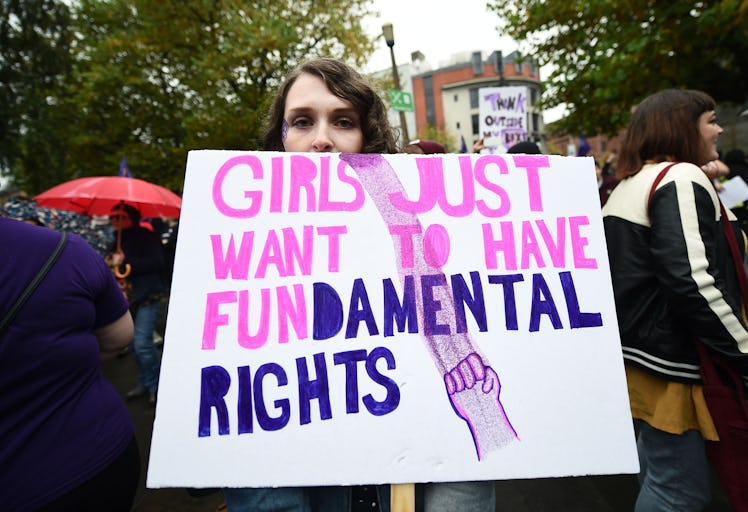
This Country Might Be About To End Its Strict Abortion Ban After More Than 30 Years
On March 28, Ireland finally set a date for its referendum on abortion rights. This is major, because the country pretty much has a complete ban on the procedure, only allowing it to occur in dire circumstances. And by dire, I mean you can't even get an abortion for some of the most extreme cases, like rape or incest. But with a date finally set to give voters a chance to say whether or not they want to repeal the law, all of that might finally change. So, when is Ireland's referendum on abortion? It's coming up really soon.
On May 25, voters will head to the polls for the referendum to vote on repealing Ireland's Eighth Amendment, which, according to BBC News, has acknowledged "the right to life of the unborn" since 1983. The order to set the date for the vote was signed by health minister Simon Harris and housing minister Eoghan Murphy after legislation to hold the referendum passed in the Seanad (aka Irish Senate), where 40 senators voted in favor of it and 10 voted against it, The Guardian reported. If the country votes in favor of the repeal on May 25, the government will reportedly create legislation that allows abortion up to 12 weeks of pregnancy. But with the support it's gotten so far, it's looking more and more likely to be passed.
Eoghan confirmed the news in a press conference early on March 28.
Ireland has already been leaning toward a more liberal society.
If Ireland voted to repeal the Eighth Amendment, it would be one of several strides in the liberalization of the country, which has had long-standing traditional Catholic views. Back in 2015, Ireland (overwhelmingly) voted to legalize gay marriage. According to The Guardian, out of an electorate of over 3 million, 1,201,607 voted in favor of gay marriage while 734,000 voted against it. Diarmuid Martin, the archbishop of Dublin, described the vote as a "social revolution" of new views and ideas among young people. He said, "It’s a social revolution that’s been going on — perhaps in the church people have not been as clear in understanding what that involved. It’s clear that, if the referendum is an affirmation of the views of young people, the church has a huge task in front of it."
Taoiseach Enda Kenny shared similar thoughts, saying the vote on gay marriage "disclosed who we are." He explained, “In the privacy of the ballot box, the people made a public statement. With today’s vote we have disclosed who we are. We are a generous, compassionate, bold and joyful people who say yes to inclusion, yes to generosity, yes to love, yes to gay marriage."
And if the people of Ireland say "yes to inclusion" and "yes to generosity," maybe that'll reflect in the upcoming vote on abortion rights, too.
Ireland's strict abortion laws have been a long-standing debate.
You might remember this case: Back in 2012, Savita Halappanavar, a dentist who was 17 weeks pregnant and lived near Galway, was denied an abortion even after she was miscarrying and learned that her unborn child would not survive. According to The New York Times, she was told that she couldn't get the procedure because "this is a Catholic country." Halappanavar died from a blood infection on Oct. 28, 2012, at Galway University Hospital, a week after she was admitted. (In 2013, the hospital apologized to her family "for the events related to his wife’s care that contributed to her tragic death" and said they were making changes "to avoid the repeat of such an event.") Her death caught global attention, and resulted in increased calls for repeals to Ireland's abortion laws. The following year, The Protection of Life During Pregnancy Act 2013 was introduced, which allows women to get abortions if there is a "real and substantial" risk to her life," which signaled a shift in the country's social transformation, according to the Irish Times.
From a recent standpoint, majority of Ireland voters have voted pro-choice in some of the biggest debates ever. So it'll be interesting to see what results this new "social revolution" produces next.